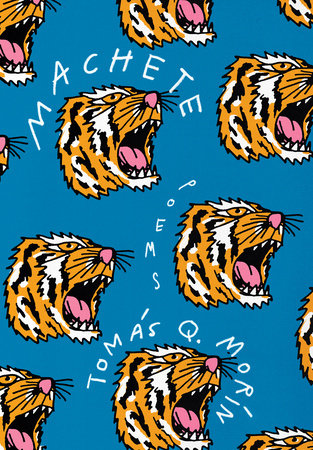If you enjoy reading Electric Literature, join our mailing list! We’ll send you the best of EL each week, and you’ll be the first to know about upcoming submissions periods and virtual events.
If I were to list the topics the poems in my new collection Machete dig into, that list would include colonialism, faith, fascism, racism, parenthood, and police violence against the BIPOC community. That’s a lot! But what unites them all is my ongoing exploration on the page with how a person endures suffering that seems endless. If I count my other poetry collections, a book I translated, and my forthcoming memoir Let Me Count the Ways, then the first five books I’ve published have all been my attempt to answer that question: how do we endure?
No surprise, The Book of Job has always been my favorite part of the Bible. That tale of one man with a mountain of misfortune heaped upon him is one of the presiding spirits of my book. The epigraph of Machete is the old Spanish proverb, “Dios apriete, pero no ahorca.” While the English equivalent is “God never gives you more than you can handle,” my literal translation strikes a different note: “God squeezes, but He doesn’t strangle.” As a survivor of childhood trauma, this question has been at the center of my art from day one. Not surprisingly, as a reader I’m drawn to books about survival in all its many forms. Here are a few books that kept me company while I wrote Machete, and a few that have made it onto my nightstand recently.
Lima::Limón by Natalie Scenters-Zapico
The poems of this collection chart how women navigate the violent waters of machismo without drowning. While she writes about women along the U.S. border with Mexico, these women could have just as easily been from my South Texas hometown. How these women find ways to thrive, and not merely survive, is nothing short of heroic.
I, Snow Leopard by Jidi Majia, translated by Frank Stewart
In this 17-part poem, after the snow leopard sees one of his brothers fall to a hunter’s rifle, he implores us to change our violent ways before that violence corrupts us and the Earth we all share.
The Passenger: How a Travel Writer Learned to Love Cruises & Other Lies from a Sinking Ship by Chaney Kwak
What could go wrong on a North Atlantic cruise? If you were on the Viking Sky with Chaney Kwak in 2019, then the answer is everything. With humor and intelligence, Kwak shares what went through his mind, and how he kept his wits, when the engine failed and the storm-battered ship went from nearly capsizing to slamming into the coast of Norway.
The Life by Carrie Fountain
In “Time to be the fine line of light,” Fountain writes:
“There are so many things
that destroy. To think solely of them
is as foolish and expedient as not
thinking of them at all.”
While one could say the backdrop of these wise, muscular poems is the Trump presidency and the pandemic, the way they examine parenting small children during times of great upheaval is timeless.
The Line Becomes a River by Francisco Cantú
This memoir charts a young and idealistic Cantú’s journey into the ranks of the Border Patrol in order to try and change the agency from within. What results is a harrowing tale of violence and callousness as Cantú mentally suffers in the belly of the beast that refuses to be anything but what it has always been. This is a powerful book about the strength of the human spirit.
Joy of Missing Out by Ana Božičević
These witty, off-kilter poems celebrate missing out on a broken world whose technology encourages us to make it the focus of our obsessions. In “#JeSuisCVS,” Božičević writes:
“Turn around and sleep my love
And I’ll hold you.” I actually
Said this to a body
On this planet where
There are such things as forks
And gods, and police cars on fire.”
The surprises in these poems don’t fade upon rereading, they deepen.
How to Make a Slave and Other Essays by Jerald Walker
These poignant essays take a scalpel to the moments when racist stereotypes are forced upon us, and how people respond when we refuse to perform the role they’ve given us. In essay after essay, Walker wanders the line between anger and laughter, and in doing so, makes room for them both. These essays sing with all the power and healing spirit of the blues.

